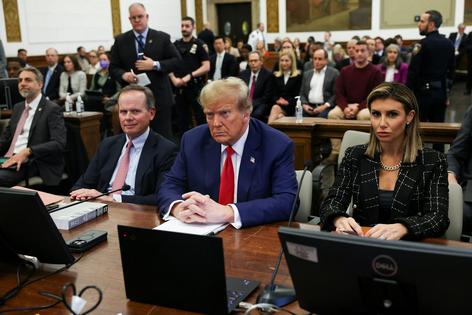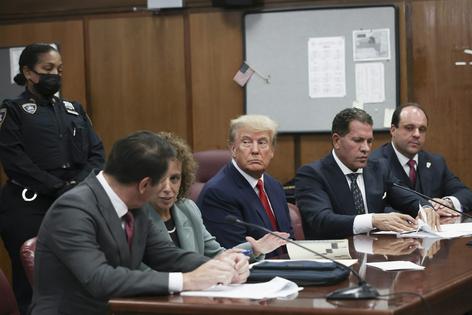Yes, Trump’s PACs really can pay his legal fees
Published in Political News
Campaign finance data released at the end of January 2024 revealed that Save America, a political action committee founded and controlled by former President Donald Trump, spent more than US$50 million in 2023 on legal fees resulting from Trump’s multiple criminal and civil cases.
OpenSecrets, a nonpartisan nonprofit tracking campaign funds, found that other Trump-aligned organizations also paid a combined $10 million in additional legal fees for Trump in 2023.
Though I have spent much of my career as a scholar of campaign finance law, I’m not certain whether that use of campaign donations is legal under federal election law. It might be; it might not be. But if it’s not, I deem it unlikely that the Federal Election Commission, which enforces campaign finance laws, would take any action.
As a general rule, campaign contributions may be used only for election-related expenses. They are not for the personal use of a candidate or federal officeholder. Federal regulations define “personal use” as “any … expense of any person that would exist irrespective of the candidate’s or duties as a Federal officeholder.” In other words, a candidate cannot use campaign funds to pay her daughter’s college tuition or the mortgage on her personal residence.
In several advisory opinions, the FEC has repeatedly allowed campaign funds to pay legal expenses that are connected to an election campaign or officeholder action, such as litigation to get on the ballot or defense against a criminal investigation concerning whether the candidate misused his office.
Many of Trump’s legal cases, and therefore their expenses, do relate to campaign activities – such as his efforts to challenge the results of the 2020 election. Others relate to his role as an officeholder or former officeholder, such as the allegedly criminal retention of classified documents at Mar-a-Lago.
Even the New York state criminal case about paying hush money to former porn actress Stormy Daniels is election-related: It involves an alleged scheme to prevent potentially damaging stories about Trump’s personal life from becoming public during his 2016 presidential campaign.
However, the civil lawsuits brought by E. Jean Carroll, in which Trump was found to have sexually abused her and then to have repeatedly defamed her, are different. They do not involve either an election or Trump’s use of office. So I would expect that his legal fees for those cases would be considered personal.
Also likely personal is the civil case in New York alleging business fraud, in which he has been ordered to pay more than $350 million in penalties.
But it appears that Save America has been paying legal fees in those cases, too. Those payments may be legal under a different provision of federal campaign law. The prohibition on personal use of campaign funds applies most clearly to the funds in the candidate’s own campaign account. But federal election law also allows a candidate to set up a separate fund, known as a “leadership PAC,” which can be used for election-related activities other than support for their own campaign.
Save America is Trump’s leadership PAC, created by the Make America Great Again PAC. Although Save America is controlled by Trump, it is technically an independent entity.
FEC regulations are relatively relaxed about payments of personal expenses by these sorts of independent groups. Third-party funds can be for the personal use of the candidate as long as the expenses would have been incurred “irrespective” of whether the candidate is running for office. If third-party funds are used to pay campaign expenses, those funds count as campaign contributions and cannot exceed the $5,000 contribution limit per campaign. But there is no limit on how much third-party funds can spend on a candidate’s personal expenses.
Even though Trump controls the leadership PAC, the FEC considers it to be a “third party.” So it can pay his personal legal expenses – though only the ones that he would have incurred even if he were not currently running for president.
It is less clear whether a leadership PAC can legally help pay the multimillion-dollar fines Trump has been assessed as a result of those trials. The logic of the FEC’s interpretation of the personal use exception would appear to permit the use of leadership PAC funds here too, but this is a truly unprecedented situation, so it is difficult to say for sure.
A remaining legal issue is whether Save America has coordinated its payment of Trump’s legal expenses with Donald J. Trump for President 2024 Inc., the committee authorized to pay his 2024 presidential campaign expenses.
An expenditure coordinated with a campaign is considered to be a contribution to that campaign. Save America’s legal expense payments are wildly above the $5,000 limit on PAC contributions to a candidate’s campaign. The FEC considers an expenditure to be coordinated only if it is made in “cooperation, consultation or concert with, or at the request or suggestion of, a candidate, a candidate’s authorized committee or a political party committee.”
The fact that Trump clearly benefits is not enough to establish “coordination.” Without evidence of some actual directive from or agreement with Trump or his campaign committee, it is unlikely the FEC would step in and allege Trump or one of his groups had violated the law.
This article is republished from The Conversation, a nonprofit, independent news organization bringing you facts and trustworthy analysis to help you make sense of our complex world. It was written by: Richard Briffault, Columbia University
Read more:
What is ‘dark money’? 5 questions answered
Trump is no Navalny, and prosecution in a democracy is a lot different than persecution in Putin’s Russia
Election spending in 2020 doubled to billion – 3 takeaways from a campaign finance expert
Richard Briffault does not work for, consult, own shares in or receive funding from any company or organization that would benefit from this article, and has disclosed no relevant affiliations beyond their academic appointment.











Comments